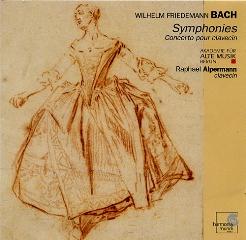W.F. Bach - Orchestral Works
W.F. Bach - Orchestral Works

Symphony D-Dur 1.Allegro e maestoso 3:10 2.Andante 2:39 3.Vivace 3:01 Adagio & Fugue d-moll 4.Adagio 4:34 5.Fugue 4:52 Concerto for harpsichord,strings and basso continuo e-moll 6.Allegretto 9:15 7.Adagio 10:01 8.Allegro assai 5:33 Adagio & Fugue f-moll 9.Trio & Adagio 4:09 10.Fugue 3:13 Symphony F-Dur 11.Vivace 3:48 12.Andante 5:03 13.Allegro 3:39 14.Menuetto I & II 2:48 Raphael Alpermann - harpsichord Akademie fur Alte Musik Berlin Stephan Mai – conductor
W.F. Bach, oldest son of J.S., had a long and controversial life (1710-84) marred by accusations of erratic behavior, the likely result of alcoholism. Be that as it may, his music certainly does not deserve the obscurity into which it has fallen. This splendid selection of pieces offers ample evidence of his skills, presenting music in a variety of forms from all periods of his professional career. The opening item, the Sinfonie in D Fk 64, features colorful writing for horns and oboes in its outer movements and some exquisite flute playing (remarkably rich-toned for authentic instruments) in the middle. The Adagio and Fugue in D minor, composed for church performances, opens with an exceptionally beautiful and deeply moving slow movement (given the right movie or TV commercial it easily could become a "pop" hit along the lines of Albinoni's Adagio or Bach's "Air" in G major), and the ensuing fugue offers no end of contrapuntal resource. Its attractive sister piece, the Adagio and Fugue in F minor, actually is an arrangement by Mozart, who composed its introductory slow section.
The four-movement Sinfonie in F dates from W.F.'s early, Dresden period, and in its quick movements it shows the same joy in wild contrasts of rhythm, dynamics, tempo, and dissonance that you can find in the music of Zelenka, though it ends with a charming minuet. By far the longest work on the program, the Cembalo Concerto in E minor is every bit as personal and interesting. Less focused on highlighting the keyboard soloist than are similar works by his father or more famous brother (C.P.E.), this piece shows an unusual degree of integration between strings and keyboard. Soloist Raphael Alpermann's selection of an attractively un-clangy, delicately lute-toned instrument adds to the impression of his being "primus inter pares" in a remarkably vibrant and intricate dialogue. The rhythmically lively but also warm and tangy string playing by the Akademie für Alte Musik Berlin under concertmaster Stephan Mai leads the ear on from one delight to the next, and Harmonia Mundi's sonics uphold the high standards of the house. If you love Baroque music, this disc is a must.---David Hurwitz, ClassicsToday.com
Last Updated (Saturday, 17 August 2013 15:29)
